Interjú Chef Kamilával
Veganorigo: When did you become vegan?
Chef Kamila: I was 14 when I first considered being vegetarian, but there was a strong push from my family’s side to put that idea aside so as a kid I followed my family’s decision, however, the desire to do something for animals, for the planet, for people, stayed in me.
A few years later, I graduated in business and marketing, and started working for big corporations: at first, I was organizing luxury weddings, then trainings for top managers located all over the world. Although I liked my job, I felt the lack of meaningfulness - this lead me to work on myself. I did some self-development and soul-searching that reminded me what’s at the core of my personality, soul, and heart - that is why I happily joined my Hungarian fiancé, Gabor when he decided to go vegetarian in March 2014. After a month, we turned vegan overnight and have never looked back. Gabor became vegan because of his health issues, I did because of my compassion for animals. The book ‘China Study’ written by dr. T Collin Campbell helped us understand the importance of a plant-based whole food diet and its effect on our health, environment and the planet.
At that time, I was working out a lot and was looking for a healthy protein source. I read more and more and found out that not only you can get a great amount of protein from grains, legumes, leafy greens and fruits, they are also much healthier and more suitable for doing sports, simply because they are easier to digest, therefore the body recovers much faster in-between trainings. That’s why there are more and more professional athletes following a vegan diet, which is really inspiring for all of us.
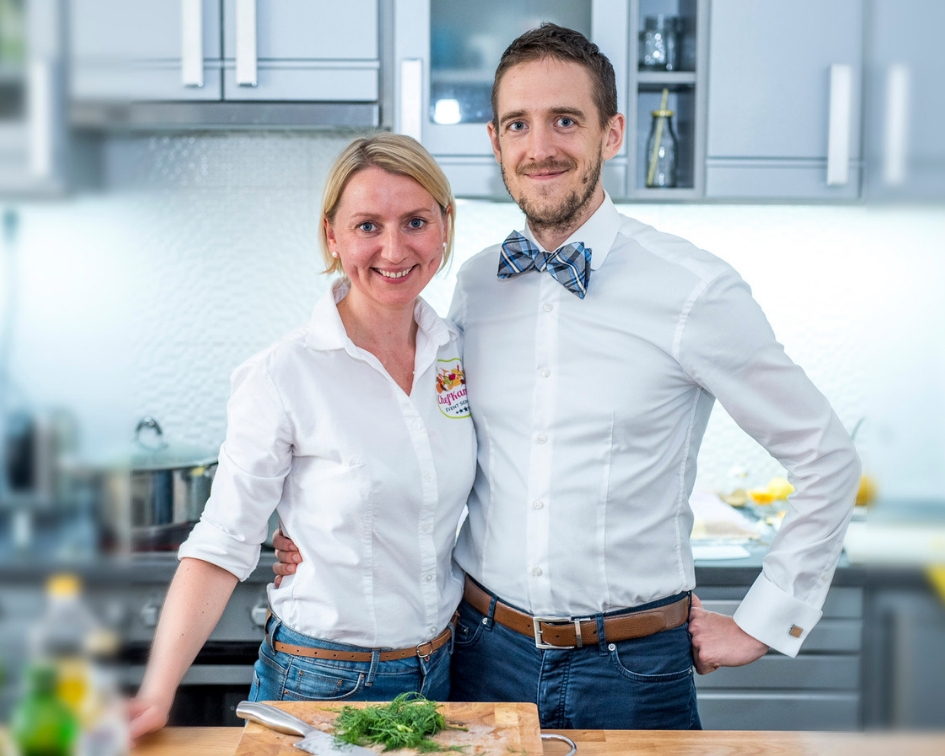
V: What has changed in your life?
K: It was a double shift for me since I had never cooked before going vegan, I didn’t even like cooking. My mom was always teasing me that I would not make a good wife if I do not cook.
For me, going vegan was not about excluding things, but rather including new ingredients and discovering a whole new world of textures and flavors. I opened up for food – I was learning about how food affects my body and my health, what it does to the environment and to animals. It was like arriving home. I really felt like myself and knew that this was the life I wanted to live. Since Gábor and I had been foodies, it was extremely important (and challenging in the beginning) to experiment with ingredients that are not only healthy but tasty as well. We had quite a few failures in the first month but we knew we wanted to stay on this path so we had to change something.
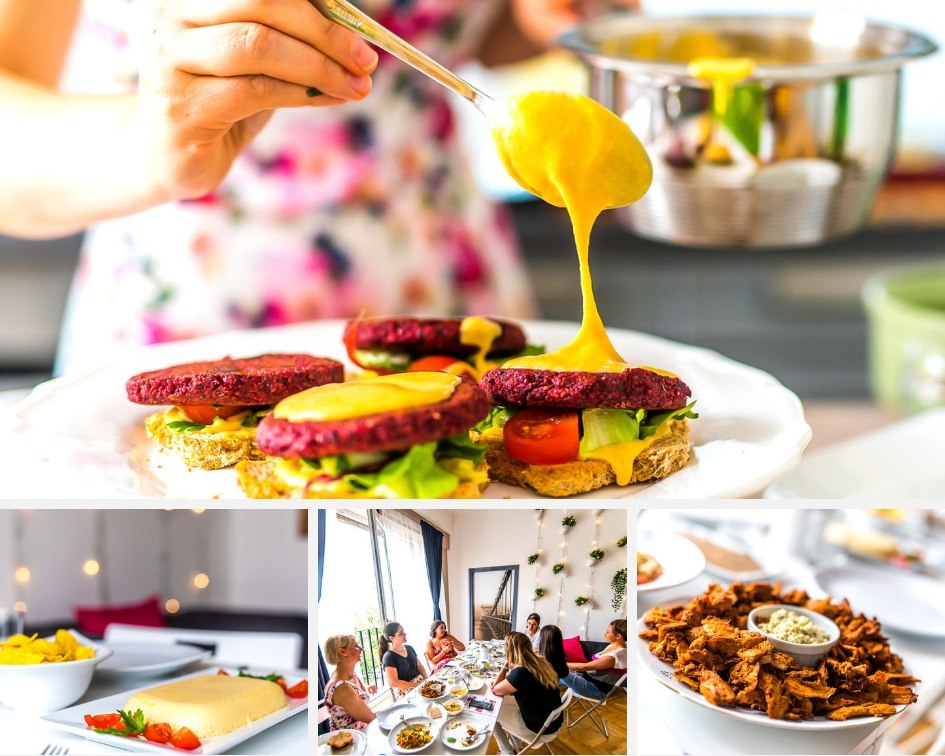
V: What did you do?
K: I had tried many recipes found on the Internet but I was often disappointed with the results. I would buy special ingredients but not to know how to properly use them. I purchased several vegan cookbooks and finally the game changer came along! “The YumUniverse” written by Heather Crosby was just it. This book showed me that a vegan diet can still be gourmet and not just boring salads or “side dishes” as a main course – as many people think. We not only turned vegan but also excluded sugar and gluten for the first 3 years for cleansing purposes so finding out that we can still eat burritos, lasagna, mac & cheese, pasta carbonara, soup, pizza, even a veganized goulash soup, was heaven for us. I totally submerged myself into cooking and it became my world.
After a few months, it was time for me to leave my job as I wanted to devote myself more into vegan life style. Gabor and I thought about opening a restaurant, however, we quickly realized that it would be hard both financially and professionally (it's not enough if one cooks well). This is why we put the dream on hold, but I kept training myself and I completed a 6-month plant-based PRO cooking course. I tested lots of recipes, took pictures and videos, I was cooking for my family, neighbors, friends, and people who kept coming over were amazed at how delicious vegan food was. This was the best feedback: non-vegan people being supportive. They said they could imagine becoming vegan/vegetarian if this diet is so delicious as the dishes I made them.
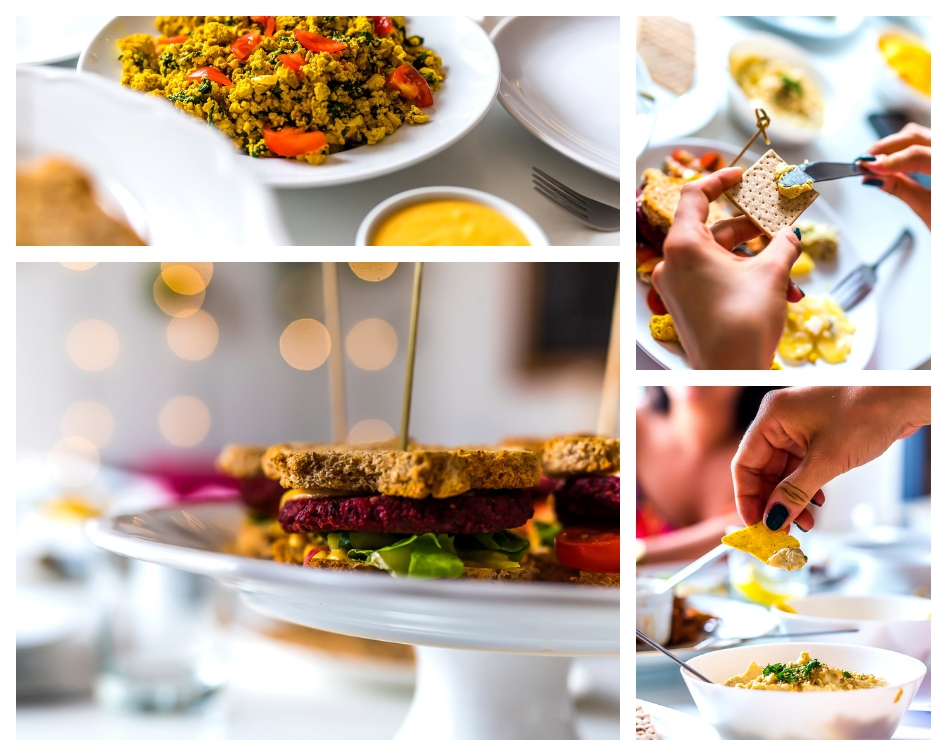
V: What was the next step?
K: I started my YouTube channel where I shared more than 60 plant-based recipes within a year. I also hold my first cooking workshops and lectures about veganism. I worked at Napfényes restaurant as a cook for a year which was an amazing experience: I got to work with professional chefs, to see how a commercial kitchen works. I learnt a lot during that period.
At the same time, I felt in my heart that my true calling was teaching others how to cook plant-based food and share the BIG “why on earth would anyone want to be vegan?!” :) People really enjoyed my workshops so, after a year, we decided to open a licensed home restaurant where I can implement all of my ideas and, at the begging of March 2018, ChefKamila’s licensed vegan cooking school and home restaurant was born in Budapest, close to Allee shopping center.
We created a space where people can learn how to cook, live healthy and eat delicious food. Going vegan is a personal choice and I am here to share what I have learned about the vegan lifestyle in the aspect of health, environment and animal welfare. I combine theory with practice: at my workshops, you can hear about my experience, apply my tricks in kitchen, taste what we have cooked and get the recipes. My clients and guests have discovered that vegan whole plant-based food is a real cuisine including desserts. I’d like to inspire people, show them the possibilities, the beauty of this lifestyle - the final choice is up to them.
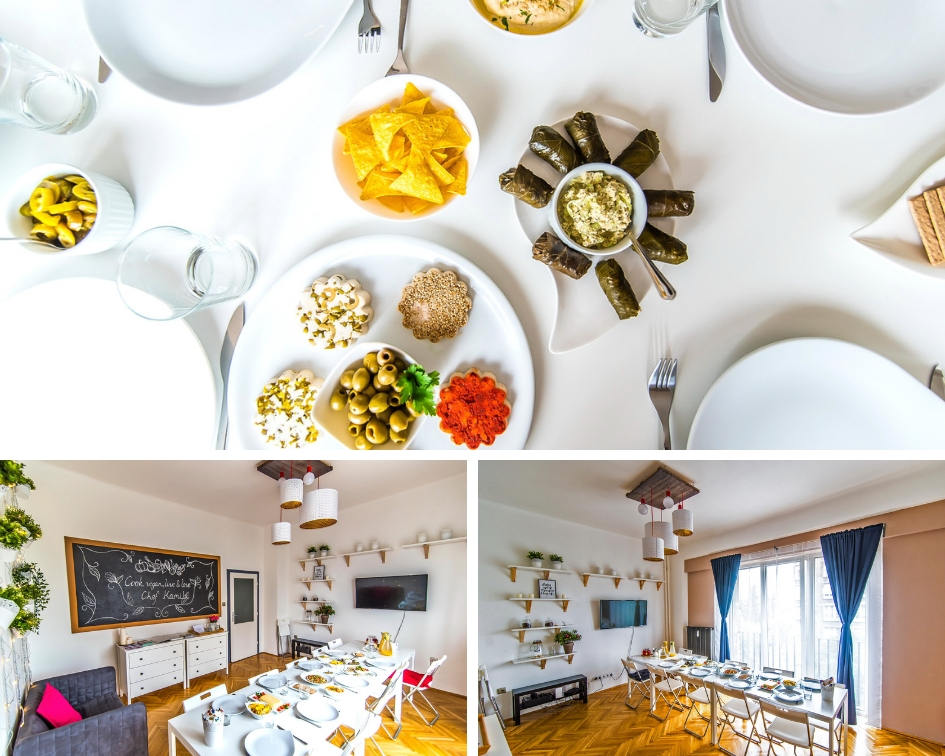
V: What do you mean by "licensed"?
K: We have all the legal papers from the government and from NÉBIH. They checked the hygiene along with the safety standards and after completing many reports, we got the license. We put our hearts into the decoration. We wanted this place to feel like home with a nice touch of a restaurant. The dining room can easily accommodate 12 people, but I can extend it to 16 people.
V: What kind of events do you offer?
K: We offer 3 types of events in our home restaurant: a seasonal 'friendly' dinner menu with three courses; a 5-course menu and a wedding menu.
The 3-course dinner consists of carrot cream soup, a veggie burger with fries and brownie with ice cream. The 5-course dinner is an extended version with vegan cheeses, Polish dumplings, carrot cream soup, enchiladas with brown rice and a salad, and, to top it all off, dessert. Guests basically roll out of here because they are so full, it’s a feast. This dinner is a great opportunity for meat-lovers because they can taste plant-based flavors very similar to meat.
Both events are for group booking only. The minimum number of guests is 8, the maximum is 12.
The first option is more suitable for a group of friends, the second one is more like a corporate dinner, however, anybody can choose either one, it’s really up to their taste and preferences. We already had groups of friends, girlfriends, hobby groups, Facebook groups, and team members from work.

V: Can you tell us more about the wedding menu?
K: Vegan weddings are on demand, however, it is not easy to find a person who can organize them. When I go to weddings, I usually get a veggie soup and stuffed peppers which are amazing if you don’t have a choice; plus, I never get a dessert, or if I do, it’s usually a fruit salad. Our wedding dinner can be booked from 12 to 16/18 people. I also offer a photographer, decoration, etc. It can be a full package or only vegan dining.
In all of our events, we accommodate dietary needs, such as gluten and sugar sensitivity, etc.
V: What about with your cooking school?
K: I offer a wide selection of workshops. One of my favorites is the “90 minutes once a week - how to eat healthy and tasty for the whole week” workshop which is essentially a “batch cooking” workshop, completed with my own concept of a “veggie box”. In 90 minutes, just once a week, I prepare versatile food options and prep different ingredients that I can use during the upcoming week. The “veggie box” can be seasonal and it can be used for 7 different meal types and 12 easy, tasty and quick recipes that I teach during the workshop. I share helpful tips and tricks on how to make meal prep fast, how to store your greens and veggies in the fridge, so they keep crisp and fresh for up to 7 days. The workshop is a combination of an introduction to the method and hands on experience (participants cook all 12 recipes in one hour). In the end, we eat what we have cooked, and participants get an eBook with the method and all the recipe.
Since most of us don’t have the time to cook everyday but still want to eat well and healthy, this workshop can be a solution for many people. Probably that is why it is our most popular workshop so far.
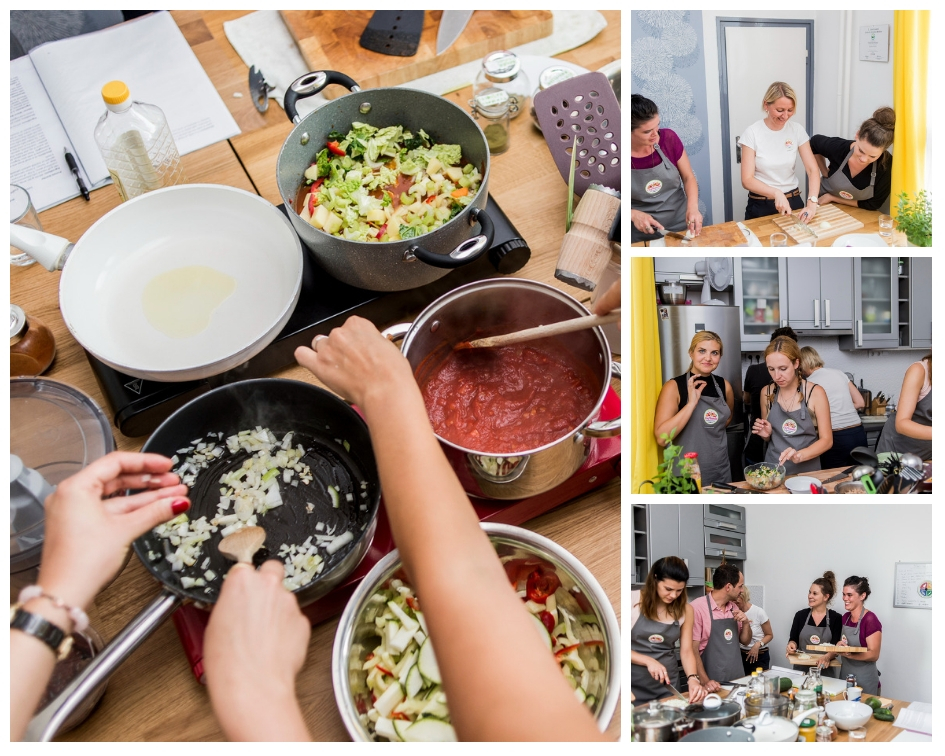
V: What other workshops do you have?
K: Starting in October, I am going to hold PCRM’s Food for Life cooking classes. The program focuses on prevention, survival and even reversing chronic diseases such as cancer, diabetes, obesity and heart disease. We will offer a weight loss and children’s health programs as well.
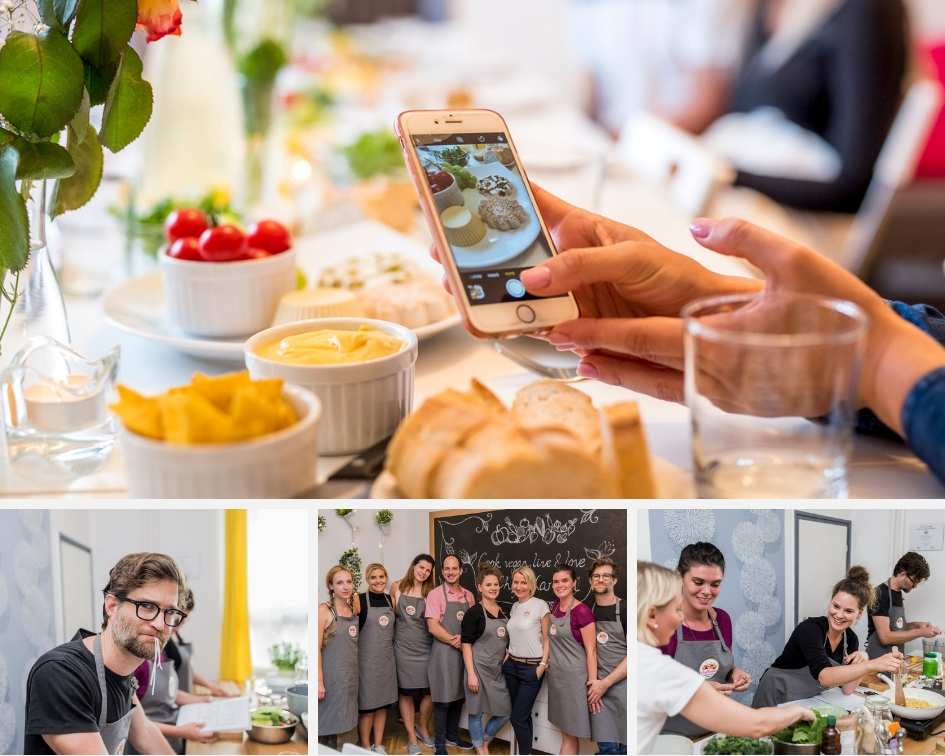
V: I saw that you were in the USA in July.
K: Yes, I traveled to Washington DC to make one of my biggest dreams come true! I became a certified Food for Life Instructor by the Physicians Committee For Responsible Medicine.
The organization (PCRM) is a non-profit founded by Dr. Neal Bernard in 1985. It has more than 12,000 registered physician members (doctors, surgeons, nurses, dieticians). They have helped many people to prevent, survive and even reverse chronic disease such as cancer, heart disease, obesity, and diabetes through low-fat whole plant-based foods. Once a year, they recruit vegan professionals into FFL’s training and thanks to that, their knowledge can be used to heal people around the world.
Their award-winning program is designed by physicians, nutrition experts, and registered dietitians, and covers several topics: employee wellness, cancer prevention and survival, diabetes, weight loss, and kid's health that focuses on healthy eating. Each class shows how foods promote health and demonstrate how to prepare simple, nutritious recipes.
The classes translate complex scientific nutrition information into simple and easy meals. Each Food for Life nutrition and cooking class features a nutrition lecture and live cooking demonstration in a supportive group setting. These are going to be available in my cooking school and hopefully other venues that re interested in them, from October 2018.
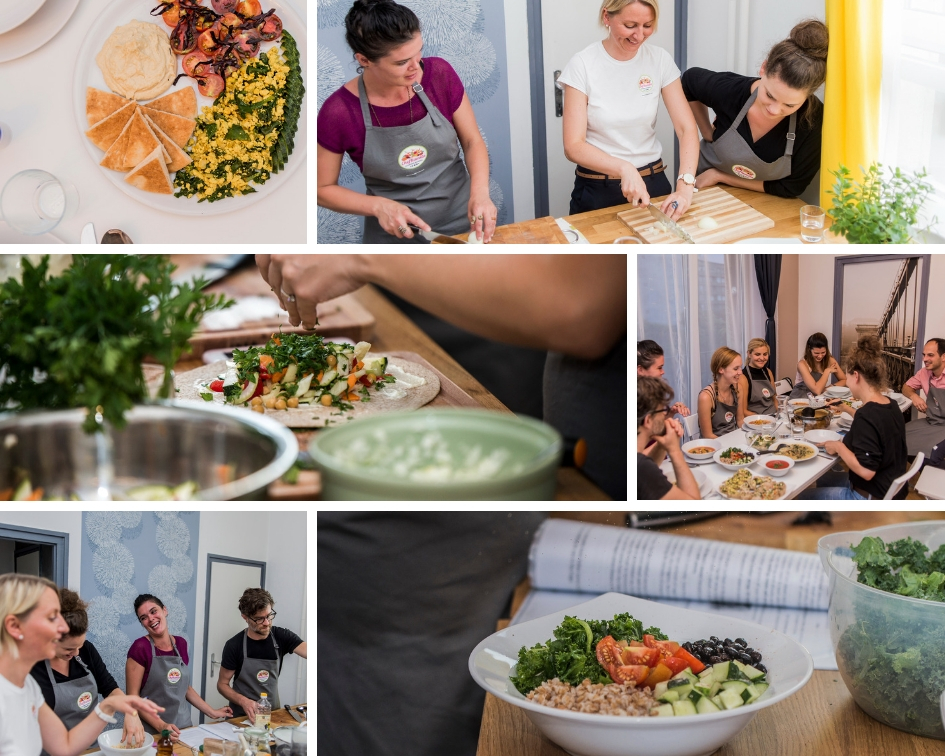
V: What does your private coaching offer to people?
K: My private coaching depends on the client’s needs. It can be anything from re-stocking your pantry with nutrient-dense foods that support your and your family’s health to a complete 21-day cleansing and weight loss program. I regularly do the ChefKamila’s 21-day cleansing and weight loss program since 2014. For 14 days, participants eat really tasty, whole plant-based meals, free of sugar and gluten. After the first week, attendees fast for 5 days: they drink organic vegetable juices and special teas to cleanse organs. The menu is designed in a way so that the stomach is prepared for the fasting to ensure a smooth transition.
Gábor’s parents join us every year with great results: his father even did better timing in a half-marathon at the age of 58 than ever before. The package with all the information is available as an e-book and people can do it on their own, or they can have me as a private coach. I help them cook and create a loving relationship with healthy foods by understanding how food affects our body and by sharing delicious recipes.
My coaching is based on PCRM/Physicians Committee for Responsible Medicine’s Food For Life Program & plant-based nutrition certification at T. Colin Campbell Center for Nutrition Studies.
V: What are your lectures about?
K: I give lectures about current challenges in the environment due to high meat consumption. How our everyday choices affect lives of millions of animals daily, along with our health. Most of us do not know where the food comes from, neither the consequences of it. It is all about bringing awareness of facts less known to the public.
I believe that every single person can make an impact on a bigger scale, the change starts in the person’s own life, in their own home. 20 years ago, there were only a few vegans and no vegan options in restaurants or grocery stores. If they had thought that they couldn't change people’s mentality on a bigger scale, it is not worth saving few animal’s lives or that it is too hard following higher morals in the society that doesn’t support them we would not have a huge vegan movement right now. Despite of the challenges and unknown future they kept being vegan, they inspired many, and those new ones inspired many more, and so on. Eating the huge amount of meat as people in western societies nowadays do, is not sustainable. We have already overpopulated the Earth. There has to be a global shift and it is happening.
Being vegan has never been easier than it is now. There are many vegan restaurants, dairy replacement products in regular grocery stores, not to mention many bio shops where you can buy meat and dairy substitutes, premade burgers and soups.
V: Can you tell me about your e-book?
K: It is called 'Easy Vegan', it is for people who would like to become vegan but are afraid of being left out of social events and criticized by family and friends. It is a combination of delicious recipes and my own stories on becoming and being vegan. An honest memoir, not a sugarcoated story.
I also ask questions like ‘what is your motivation to be vegan?’ There will be times when being vegan is challenging but if you have the right motivation, you will most likely stick to this lifestyle. I share several ways of eating out, for example, if you go to a non-vegan restaurant, you may simply ask for a veggie plate, or ask the chef to surprise you with whatever they can create from veggies, legumes and grains. Better yet if you call the restaurant ahead of time. The chef will most likely be happy to accommodate your needs and your friends will eat half of your meal because your plate will look much better than theirs.
V: What are the feedbacks of your services?
K: They are great, you can take a look at them in my guestbook and on my FB’s review section. My guests are always amazed how many different flavors and meals they can try during a dinner and surprised how full they are. Many people think if you go vegan, you will always be hungry, however, they don’t actually crave anything because they are full on a whole plant-based level and not on an empty calorie level. You can be vegan in many different ways: coke and French fries can be vegan but if we want to cure not only the planet but our own body as well, it is recommended to go for whole plant-based foods and that’s where I can help. From curiosity and info gathering, through decision making, to full-time dedication, whatever stage people are in, I have a workshop, lecture or service to support a pleasant, joyful and efficient transition.
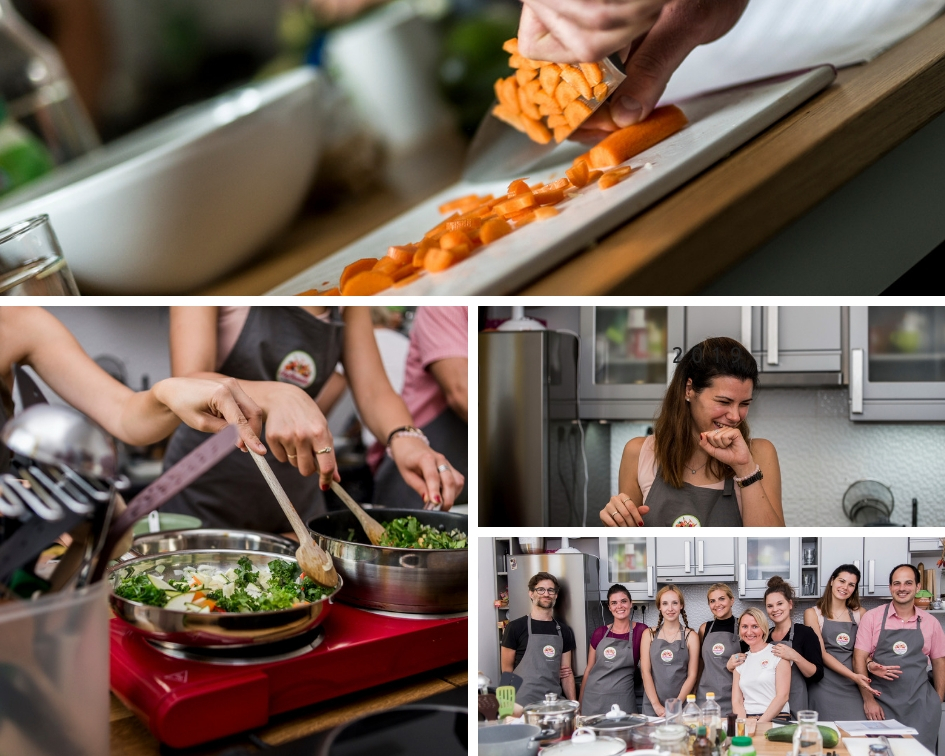
V: Where can people find / follow you?
K: Through my website and social media: Facebook, Instagram, YouTube, (or directly at kamila@chefkamila.com / +36 20 281 2181)
Fotók: Chef Kamila
Riporter: Horváth Edit
További interjúk itt olvashatóak.
Karalyos Gáborral, a Vegán Hegylakóval vegánságról, receptekről, kertről, hegyről.
Slezsák Csillával és Váry Krisztivel Ultrabalatonról, vegánságról, barátságról. Hogyan lesz egy magányos vegánból társasági lény? Hogyan készülnek fel egy akkora távra, amit még soha nem futottak le? Kinek dedikálják a futásukat?
Hári Richárddal, a Vegan Tigris tulajdonosával a vegánság és a spiritualitás kapcsolatáról; a teljesértékű növényi táplálkozás testünkre gyakorolt hatásáról; a Vegan Tigris koncepciójáról és Indiáról.
A Földlakók (vegán) iskola alapítóival a tanulócsoport koncepciójáról, és a legfrissebb fejleményekről.
Interjú Gacsó Anikóval, a MAVEG egyik alelnökével: 15 év vegetáriánusság után mi terelte a vegánság felé; milyen kihívásokkal néz szembe ma egy vegán család Magyarországon; mi a helyzet a közétkeztetésben, ha valaki növényi alapú étrenden van; milyen lépéseket tesz a MAVEG a vegán családok érdekében és hogyan lehet segíteni az egyesületet.
Bonifert Annával a vegán állatvédelemről. Az egyik legismertebb magyar, vegán állatvédő aktivista. Több állatvédelemről és vegánságról szóló könyv és cikk szerzője.
Juhász Máriával és Paál Bélával, a Kis Padlizsán Vegán bistro tulajdonosaival: az interjúból többek között kiderül, hogy miért volt Marcsiék hűtője tele sárgarépával; hogyan lett Béla mérnökből szakács; hogy miért feküdt ki János bácsi a palánták mellé; és milyen speciális adalékot használnak a tökfőzelékbe.
Gacsó Anikóval, a MAVEG egyik alelnökével arról, hogy 15 év vegetáriánusság után mi terelte a vegánság felé; milyen kihívásokkal néz szembe ma egy vegán család Magyarországon; mi a helyzet a közétkeztetésben, ha valaki növényi alapú étrenden van; milyen lépéseket tesz a MAVEG a vegán családok érdekében és hogyan lehet segíteni az egyesületet.
Fill Good csapatával Vetsey Nórival, Péntek Zolival és Vetsey Bálinttal: az interjúból többek között kiderül, hogy mit szólt a család, amikor Nóri gyerekként bejelentette, hogy vegetáriánus lesz; milyen együtt dolgozni családként; mi a sütöltöde koncepciója; mi a titka a habkönnyű pogácsáiknak; mennyire vannak hatással az Olaszországban töltött évek a kínálatra; miért szeretik a környékbeli nénik a kalácsukat és miért nem használták az idei Kerékpáros reggeli logot.
Varga István, Nyers Séffel: az interjúból többek között kiderül, hogy miért lett nyers vegán; hogyan lehet ezt Magyarországon kivitelezni; miért a Holdhoz köti a Nyers kihívást; melyik országban tart minden évben Nyers nyaralást; milyen tanfolyamokat szervez; meddig áll el az aszalt lenmag kenyér; miért kell a magvakat beáztatni fogyasztás előtt; miért fontos az enzimdús táplálkozás; mit jelent a menzareform és milyen gyermekotthont támogat Erdélyben.
Lincoln Telma énekesnővel: az interjúból többek között kiderül, hogy milyen értékrendet szeretne átadni kisfiának, Marcinak; hogyan oldotta meg az óvodai vegán étkezést; hogyan világosítja fel kisfia az óvodatársait arról, hogy mi is van a tányérjukon; mi a lényege a Földlakók Környezettudatos Suli Projektnek; miért váltott balettról éneklésre; milyen zenekarokban énekel; mekkora hatással van az életére Afrika és miért jó kisgyerekkel utazni.
Zabezsinszkij Annával, az első magyar vegán szabadulószoba tervezőjével: az interjúból kiderül, hogy mi is az a Dumbster Diving; hogyan segített Anna elindítani a vegán Túró Rudit; mi a koncepciója az általa tervezett és kivitelezett vegán szabaduló szobának; miben tudna segíteni, hogy Magyarországon is elindulhasson egy; milyen mini menhelye van; milyen főzőkurzusokat tart és milyen vegánsággal kapcsolatos pályázati lehetőségek vannak világszerte.
Regölyi Lillával és Regölyi Péterrel, a Vegan Love és a Magic Burger tulajdonosaival beszélgettünk arról, hogyan alakítják ki a kínálatot, honnan inspirálódnak, mi az egyik fő oka a külföldi útjaiknak, hogy haladnak a Zero Waste felé és az állatvédelem fontosságáról.
Szaluter Edittel, a Kertkonyha megálmodójával. Beszélgettünk a főzés szeretetéről, a Kertkonyha megszületéséről, vegán szaloncukor készítő tanfolyamról és még megannyi más dologról.
Csir Kevinnel, arról, hogy mit is jelent vegánnak lenni? Merre halad a mozgalom? Hogyan válhatsz vegánná? Milyen hatással van az állattenyésztés a környezetre? Mi az összekötő kapocs a vegánság és a különböző emberi jogi mozgalmak között?
Sipos Nórával, a NoraSpiration megálmodójával beszélgetünk vegánságról, bloggerkedésről, evés zavarokról, és még megannyi másról...
Korpádi Péterrel vegán aktivizmusról. Mit csinál egy vegán aktivista? Mi az az Earthlings Experience? Mit jelent az Anonymous for the Voiceless? Mit csinálnak a SAVE aktivisták? Hogyan lehet csatlakozni? Hogyan lehet támogatni?
Egyed Brigittával a jóga és a vegánság kapcsolatáról.
Váli Tamással vegán életmódról, növényi táplálkozásról, testépítésről, mítoszokról. Elegendő a fehérje? Mit eszik egy nap? Mennyit edz? Mit tanácsol az étrendünk összeállításánál? ...és még megannyi érdekes információ róla és a vegán testépítésről.
Nagy Mártonnal a Vegan Garden egyik alapítójával.
.Varga Balázzsal a táplálkozás és a sportolás összefüggéseiről.
Sőtér Kittivel, a PlantmyilkyWay cukrász megálmodójával beszélgettünk az egészség és a vegánság kapcsolatáról; arról, hogy mi kell a tökéletes vegán macaronhoz; mivel lehet helyettesíteni a tojást a süteményekben; és megannyi egyéb édes dologról...
Ha szívesen olvasol angolul interjúkat nemzetközi influencer-ekkel, akkor itt megteheted.
Richard Watts-szal, a Vegan SideKick alkotójával. Szinte minden vegán találkozott már a munkásságával, a legtöbbször megosztott alkotó, de kevesen tudják ki áll a rajzok mögött.
Ullenkával arról, hogyan gyógyította meg a súlyosan ekcémás kislányát a nyers vegán étrenddel.
Marlena Rozenberggel a vitorlás életmódról vegánként. Hogyan szelték át a Csendes-óceánt, mi volt a legnagyobb élménye és hogyan lehet felkészülni egy ekkora útra.
Mariia Goldschmidttel, a Tofu Family-ből, családról és fitt életmódról növényi alapokon.
Jo Fredericks-szel a vegánság és a művészet kapcsolatáról.
Seb Alex-szel, aki állatjogi aktivista, vegánságról, Anonymous of the Voiceless megmozdulásokról, és egyéb az állatokat támogató lehetőségekről.
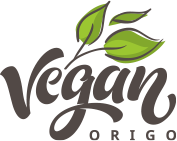
Follow us on: